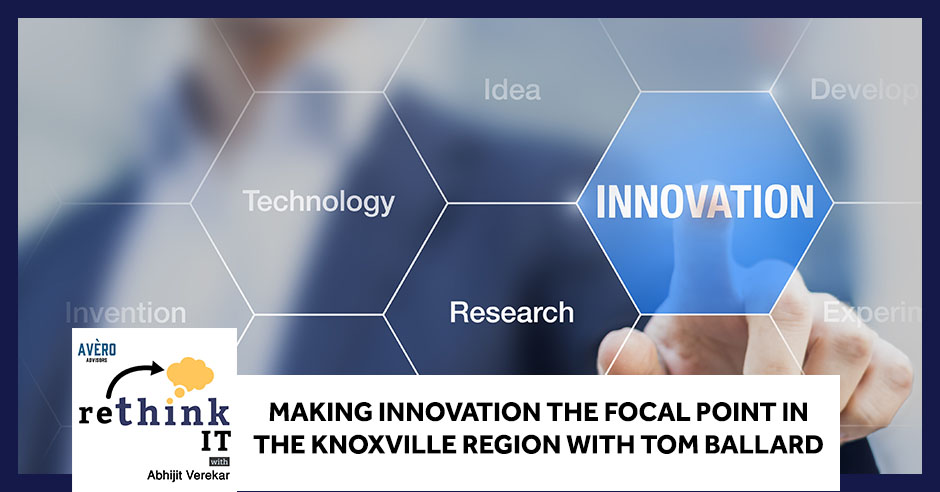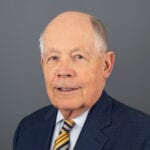Making innovation the focal point in the Knoxville region With Tom Ballard

It is in the best interest of the government and innovators to join hands and move together into the future so they can better the lives of people. This episode’s guest, Tom Ballard, the Chief Alliance Officer of PYA, P.C., has successfully done that. He sits down with host, Abhijit Verekar, to take us into how Knoxville, Tennessee, has made innovation its focal point and how he is leading in putting people who are innovating in the region into the limelight. On top of that, he also shares his origin story where he discovered the value of innovation in local government, helping citizens and businesses most especially in this current COVID-19 environment. Join Abhijit and Tom as they further talk about the role of the government when it comes to innovation and helping the public.
—
Listen to the podcast here:
Making innovation the focal point in the Knoxville region With Tom Ballard
Our guest in this episode is Tom Ballard from PYA. He is the voice of innovation as I call it in the Knoxville area. He runs a successful blog, Teknovation.biz. Check it out. He covers everything innovation, startups, venture capital in the Knoxville region. Tom, welcome to the show.
It’s good to be with you.
Thanks for making the time. Our show typically talks to innovators, CIOs and city managers in the government sector. As far as I’m concerned, I think those two sectors are in the best interest of the government and innovators to join hands and move together into the future. I wanted to have you on the show so we could talk about it. We’ve had innovation as a focal point and it’s surprised me when I found out. I’m fairly new to the region, but I’m thrilled about everything that’s going on. You, being at the forefront of putting people that are innovating in the region into the limelight, tell me about your story. I know you’ve done a lot of work with UT and other agencies, but how did you start and what brought you into this innovation sphere?
As you pointed out, the University of Tennessee started it. I spent 32 of 35 years there. We’re involved with an organization called the Institute for Public Service. That was a nonagricultural extension service for cities, counties and manufacturers. I have worked for years with local government officials. I wrote a grant in 1978 to the National Science Foundation to create something called the Tennessee Innovation Group. It was an effort to bring innovative technologies to the local government. Since you’re in my hometown of Maryville, it was one of the early participants in that program. Innovation in local government is something important. I was involved in innovation and entrepreneurship at the University of Tennessee. I retired there and went to Oak Ridge National Laboratory.
I thought I was going to slow down, but I ended up running tech transfer, economic development and industrial partnering. I continued to be involved in the innovation and entrepreneurial space on a larger geographic basis because, with ORNL, I worked all across the South and beyond working with local and state governments. I am working with universities to connect, ORNL and its assets and people to those communities and ecosystems. I then decided I’d try another slow-down, which has worked very well. When I turned 65 at the end of 2011, I joined PYA, which ended up itself as an entrepreneurial success story. We launched the Teknovation.biz blog on January 23rd of 2012 and I’ve learned so much more about what’s going on in the Eastern half of Tennessee in the last several years because we publish 5 or 6 days a week.
Innovation is about doing something that improves on what you're doing now. Share on XIt’s thoroughly enjoyable. Before we go on, Tom, the word, innovation, is often used and sometimes misused. What is your definition of innovation?
My definition of innovation is doing something. It can be hard technology, solve technology or process, but it is improving on what you’re doing. Being innovative, improving on a product, a service, the way you deliver it, or whatever. Clearly, we’ve seen how technology, innovation and entrepreneurial thinking have come together in terms of allowing people to maintain contacts, active businesses, deliver services in an environment because people got innovative. They figured out how to do it, and it wasn’t that they wanted to necessarily do it that way, but they had to, and they figured out how. To me, that’s innovation.
For almost overnight, we adopted things like video conferencing that has been around for many years.
I go back to 1991 and I was chairing for the University of Tennessee. Lamar Alexander was still present and I was chairing in an effort to build a statewide telecommunications network with what was then cutting edge. It was a compressed dial-up video. One of the things that we were doing then was a dermatologist at the UT Medical Center who was doing remote dermatology at Woods Memorial Hospital in Ottawa, Tennessee. You think that it’s taken so long for telemedicine to grab a hold, but it has exploded. It was an innovation ahead of its time, but it was an innovation ready for a pandemic.

Innovation In Knoxville: It’s in the best interest of the government and innovators to join hands and move together into the future.
Along the same lines in our clientele, it’s the legislative process. The council meeting, the commission meetings, overnight, it was adopted and it’s working great to the point where some of our clients don’t want to go back to the way things were before.
It also makes the government more accessible to the citizens because those who may have disabilities or other reasons that they can’t go to meetings, they can observe their government in action. To the extent that those conversations are allowed, you can participate in those meetings remotely. I think it’s great for the government.
You mentioned a good point. As long as conversations allowed, there is some room there for improvement and consensus. There is a better term, but because it depends on who the city or county is and what their lawyers are telling them, do you allow for comments on Facebook Live or something else? There are lots of discussions still to be had, but you’re right. It’s in the right direction. Tom, in 1972, you were involved with innovation for local government.
I joined the University of Tennessee in 1969. I started the Institute for Public Service in February of 1970, 32 of my 35 years at UT. I was part of that. I led it for the last 20 years of those 35 years at UT. It was a part of my life that’s vibrant, memorable, and enjoyable and the City of Maryville was under Gary Hensley, who is a long time City Manager. I worked with local government officials across the state for many years.
I keep saying that I’ve been in this profession for a long time, but not long. You’ve been there forever. When I came to Blount County in 2015, I like to say that they were behind technology at least 20 to 25 years. Since you were working with them, we’re talking about going from paper to any kind of technology back in the day. What was it like back then?
The government should be an enabler, but not the primary funder of activities. Share on XOne of the most positive things that it was like back then, and this is across the State of Tennessee, not focused on Blount County, is you had businessmen and women who chose to run for public office. They were public servants in the true fashion. That is not the case across the state. Tom Taylor, the Mayor of Maryville, we grew up together. We were in Maryville High School, junior high school and high school together. I’ve known him for a long time. Maryville and Alcoa had a history of great elected officials and city managers. Blount County, the same sort. There are people who want to do the right thing, but there’s an increasing challenge about investment and local government in a way that allows innovation to occur and improve services to citizens to occur. There’s this great push back on paying taxes and that sort of thing. It wasn’t as prevalent in the ‘70s, ‘80s, and ‘90s as it clearly is across the country now.
The pandemic and what it’s going to do to tax collections and how ultimately that’s going to play out in terms of services, investment in public works, in roads and schools, and so on. It’s going to be a challenging time for public officials. You asked earlier about innovation and I mentioned the grant that I wrote. What Blount County did was something that you take for granted, but at the time, in 1978, it was curbside garbage collection. That was an innovation. Back then, you had the garbage collectors went in people’s backyards carried the cans forward. The notion of curbside was revolutionary, but its impact on improved service to the citizens at a reduced cost over the long-term paid out. That was one of the innovations that they came out of that revolution years ago.
We did take it for granted because every week on trash night, I complain about it. You are right, the innovation doesn’t always have to be technological. Here we are, many years later, still talking about modernization and improving things in the government. Given that our backs are against the wall due to the pandemic, we’re going to have to get innovative and creative with how we budget for improvements. The good part of all of this in my head is that public-private partnerships in technology are taken off in a good way. Some cities, like Knoxville, encourage tech companies to come up with civic ideas that will improve the lives of citizens and you’ve been overseeing it from Teknovation standpoint. You know what’s going on with the pitch competitions that KEC holds and all of these wonderful things going on in Knoxville. Give us the lay of the land on the tech ecosystem in Knoxville.
It’s more vibrant than it was years ago. I’m reminded of a study that was done by an organization that doesn’t exist anymore. It was the Southern Growth Policies Board and the person who was chairing the board at the time, went on to be the President of the United States. It was Bill Clinton. He was the Governor of Arkansas. They came out with a report called Halfway Home and a Long Way to Go. That title many years later still rings with me because Knoxville has made great progress. Maryville’s, Alcoa, and Blount County are making great progress. One of the ways that Blount County is doing, thanks to the local governments and the Blount Partnership is the Sky City Entrepreneur Center, the coworking space to try to help support entrepreneurs there. We have a lot of assets that we didn’t have in 2012.

Innovation In Knoxville: Given that our backs are against the wall due to the pandemic, the government is going to have to get really innovative and creative with how we budget for improvements.
You mentioned the Knoxville Entrepreneur Center. It didn’t exist then. The Anderson Center for Entrepreneurship and Innovation at UT Knoxville had come on board. We didn’t have any real coworking spaces in the community. We didn’t have a startup day celebration that’s done every September. I believe in 2020, it will be September 29th. It’ll be virtual. There were a lot of things that we didn’t have. We didn’t have The Innov865 Alliance that is trying to pull everybody together to collaborate. That’s an important point that we shouldn’t pass up on what you were talking about, public-private partnerships and collaboration. I’m reminded of a quote that Jeff Lyash, CEO of TVA, said as a kickoff of a study that a National Entrepreneurial Organization is doing about the region. That organization is called Techstars. It was founded by a well-known author many years ago. Techstars does a lot of programs around the country.
Jeff quoted here is one about, “We need to set aside our individual interest and focus on our collective interest.” To me, that applies in the entrepreneurial space, in the community space, and the government space. I know you’ve some experience working with the Maryville, Alcoa and Blount County in terms of how they’re collaborating and cooperating. That’s going to be our future, more collaboration and cooperation, not competing. We’ve got to get over the Friday night football rivalries, but that’s going to allow us to do a lot more. That’s where we’re making good progress in Knoxville. There are still some challenges out there, not just in the greater Knoxville region, but there are challenges that we still have to overcome.
What’s next for the region? I want to figure out what the best way for a public-private partnership is to take the government forward. There’s a lot of good stuff in the industrial commercial side and in government tends to be slightly behind. Many times, it’s by design. You don’t want to be on the bleeding edge and bleed out. You want to see what’s proven and what’s good for the taxpayers. What’s going on in the startup/VC infrastructure in our region that we should be looking at for next?
There are two things. One, in terms of what’s going on, the Techstars study is one that people who are interested in the greater Knoxville region need to be aware of. Techstars is coming in and taking an assessment of the strengths, the weaknesses, the opportunities, and the threats or challenges of the sector. It’s being funded by, ORNL, the University of Tennessee, and TVA. The results of that study will be released if they stay on schedule and with the COVID-19, schedules could get impacted. The results of that study and the recommendations will be coming in September 2020. That study is going to look at everything from how we take advantage of intellectual property coming out of Oak Ridge National Lab and UT to how we take advantage of talent we’re developing or talent we’re importing here. It goes to UT for undergraduate or graduate work or other institutions.
The government should be risk-averse because it's their job to protect public funds. Share on XHow do we keep it here? Studies also going to look at how do we get more investment capital? This is by and large, an investment desert in terms of an Angel and venture capital. This is a risk-averse region, but that also feeds a little bit to the second point I want to make, which is, what’s the role of government? I have lived here for a few years so I still got a lot to learn about the region. This region is a government dominated economy, particularly Knoxville and Oak Ridge. With the DOE plans in Oak Ridge, TVA, the University of Tennessee, Blount County, a little bit more diverse. I think governance too many times in this region people tend to see what the government thinks ought to be done. What the government’s role should be in my view is twofold. Number one, there is a bulletproof that elected officials have and should use for the right reasons.
Second is the government should be an enabler, but not the primary thunder of activities, because then you need to get the private sector all the sidelines and engaged. There is in the entrepreneurial space. There are public benefit companies that are started. There’s one in Knoxville that the founder I was emailing with, but for the most part, startups are focused on making money. You need the private sector supporting that in a variety of ways, not just with writing investment checks, but being early customers or first customers. The government can take advantage of certain technologies that are coming out of startups and it should, but it can also create the business climate, use to bulletproof it, and maybe some seed investment to get things started. They should not always be funded by the government.
I’m with you there. You made a good point on how this region tends to be an investment desert that also leads to it being a customer desert if you’re not investing in building those companies. Eventually, the whole point is to make money doing entrepreneurial things and doing good to the society. I want to switch gears a little bit here. A lot of our clients struggle with innovative thinking. As you said, the government needs to be the risk-averse because that’s their job to protect the money public funds at the same time, we challenged the government to do better and be innovative. Where do you think the line is drawn on government operations to take risks as well as to be the stewards of the government funds?
In my University of Tennessee days, I was responsible for pulling together a lot of teams to help move initiatives in the public space. That meant the government is involved. There was a task force on the solid waste that I was heavily involved with. I led one on something called Public Chapter 1101 in 1998, which was the Growth Planning Law and other things. I think what people have to do is first assess their leaders, the people they’re trying to work with. Too often, people come into something and say, “I’m a change agent. I’m going to do this. You just need to do this. You need to listen to me.” This is probably the best way to describe my philosophy. It’s a story from years ago. It was an old college classmate that I hadn’t seen in for many years.

Innovation In Knoxville: Trust is built up on a personal relationship where you’re helping the other see what they’re trying to do and, conversely, what you’re trying to do.
He was a few years older than me. He was in law school when I was an undergraduate. I visited with him in March of 1987. He was the executive assistant to a new Tennessee governor. I was making the rounds visiting with the state government because we also worked with the state government. I remember sitting with him and he said, “Tom, you’re the 3rd or 4th person from the University of Tennessee who already come to visit with me. I want to help the university. I’m an alumnus, but we got some real challenges here that we’re dealing with the state administration.” When I mentioned those people’s university, I said, “I can’t help you with that, but will you support my initiative?” This individual, his name was Jim Hall from Chattanooga. He asked me this question and it stuck with me for years. “Tom, is there anybody at the University of Tennessee that wants to work on our agenda, not just their own?”
I said, “Jim, I didn’t take the University of Tennessee to raise, but I’ve got my part of the university and I’ll commit to you. They will work with you to try to help on some of those things.” What was the result of that? As he got to know our organization more, then we became a more valued ally to that gubernatorial staff. We saw a 10X increase and contract funding over eight years because we understood what their priorities were. We tried to help them achieve those and then they were more receptive to ideas that we brought to them or approaches that we thought might work better. When you asked the question, how do we get people to move faster or move beyond where they’re comfortable moving? It’s through trust and trust is built up in a personal relationship where you’re helping. You see what they’re trying to do being more important. Initially, that’s what you’re trying to do.
That is a great story. I wonder how much that changed the landscape. I also wonder what the answer might be if the same question was posed. Tom, I’ve enjoyed working with you. I don’t miss out on a chance to have a discussion with you about technology. Any other things you want to talk about?
I alluded to it earlier. I want to say special thanks to the mayors of the two cities, the county mayor, the two city managers, the Blount Partnership for supporting the Sky City Entrepreneurs Center, the coworking space there. What entrepreneurs need is you’ve got your own office, but you’ve been in Blount County for years. I don’t know when you got here if there had been a coworking space where you could have begun to be connected and introduced as it would have made a difference. There are a lot of people out there that have ideas that have needs and those creative collisions are enabled when you have a facility like Sky City. I applaud the local governments and the partnership for being far-sighted enough to say, “We’re going to incentivize this.” That enables however you want to call it. That is an important role of government because it’s an economic development play for a community. I salute them.
I do too. We’re a young company. I don’t think we’re a startup in the true sense. In my head, we always will be because that’s how I run this place, but we know Sky City wasn’t the thing that there wasn’t a coworking space, but there was a coffee shop called Vienna Coffee that we would hang out at. John would not mind if we bought one cup of coffee and sat there all day. Fellow entrepreneurs like him also are part of the ecosystem, but you’re right, the two cities and the county, that’s where I launched the company. Blount County is our first ever client and it wouldn’t have happened if Mayor Mitchell on the other end, was not receptive to ideas that we will bring into the table. That’s a great conclusion. Tom, I thank you for making time for this.
Thank you. I appreciate the opportunity.
I look forward to the next Teknovation. Thank you, Tom.
Important Links:
- PYA
- Teknovation.biz
- Institute for Public Service
- The Innov865 Alliance
- Techstars
- Sky City Entrepreneurs Center
- https://www.PYAPC.com/team-member/tom-ballard/
About Tom Ballard
 Tom spent more than four decades building business connections between two major entities in East Tennessee and public and private organizations throughout the region, state, and nation before joining PYA in 2012 as Director of Innovation and Entrepreneurial Initiatives. He was the inaugural Director of Partnerships for Oak Ridge National Laboratory. Tom was with the University of Tennessee for 35 years, serving as Vice President for Public and Governmental Relations before joining ORNL.
Tom spent more than four decades building business connections between two major entities in East Tennessee and public and private organizations throughout the region, state, and nation before joining PYA in 2012 as Director of Innovation and Entrepreneurial Initiatives. He was the inaugural Director of Partnerships for Oak Ridge National Laboratory. Tom was with the University of Tennessee for 35 years, serving as Vice President for Public and Governmental Relations before joining ORNL.
He serves on the board of directors of a number of local and regional not-for-profit organizations including the East Tennessee Economic Council (Past Chair), Life Science Tennessee, Oak Ridge Economic Partnership (Past Chair), Roane State Community College’s ACE Advisory Council (Chair), Technology 2020, and Tennessee Technology Development Corporation (Vice Chair). He is a member of UT’s Development Council and the Pellissippi State Community College Foundation.
